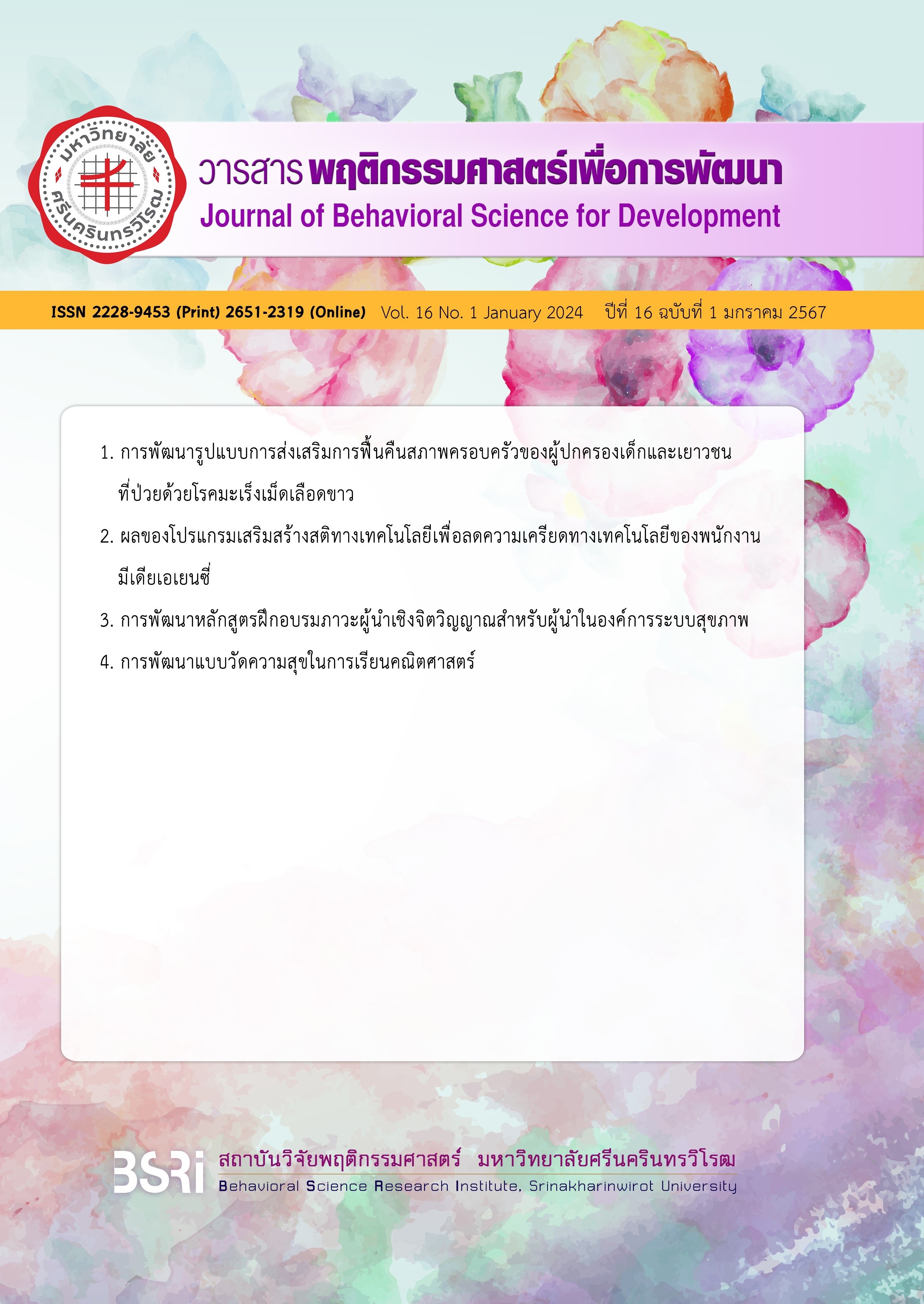Effect of IT Mindfulness Enhancement Program in Reducing Technostress in Media Agency Employees
Keywords:
Technology, mindfulness, technostress, employee well-being, job satisfactionAbstract
The current study aimed to examine the effectiveness of the IT mindfulness program among media agency employees by measuring mean scores of IT mindfulness, technostress, employee well-being, and job satisfaction before and after joining the program. The researcher developed the program by integrating literature on IT mindfulness and its elements consisting of the alertness to distinction (AD), the awareness of multiple perspectives (AP), and the openness to novelty (ON) incorporating the Mindfulness Experiential Learning Theory. Participants were 30 media agency employees purposefully selected to join the intervention program. Data were analyzed with SEM. The results showed that the mean scores of IT mindfulness and employee well-being of the experimental group after joining the program were significantly higher than before joining the program (d = -.56, p < .05) and (d = -.39, p < .05), respectively. The mean score of technostress of the experimental group after joining the program was significantly lower than before joining the program (d = .59, p < .05). Learning from the current program could benefit heavy-tech organizations and their employees. The content of the program could be applied to mitigate technostress and increase employee well-being in organizations.
References
Achor, S. (2018). Big potential: How transforming the pursuit of success raises our achievement, happiness, and well-being. Currency.
Bailey, N. W., Nguyen, J., Bialylew, E., Corin, S. E., Gilbertson, T., Chambers, R., & Fitzgerald, P. B. (2018). Effect on well-being from an online mindfulness intervention: Mindful in May. Mindfulness, 9, 1637-1647.
Bajaj, B., & Pande, N. (2016). Mediating role of resilience in the impact of mindfulness on life satisfaction and affect as indices of subjective well-being. Personality and Individual Differences, 93, 63-67.
Bostock, S., Crosswell, A. D., Prather, A. A., & Steptoe, A. (2019). Mindfulness on-the-go: Effects of a mindfulness meditation app on work stress and well-being. Journal of Occupational Health Psychology, 24(1), 127-138. https://search.ebscohost.com/login.aspx?direct=true&AuthType=sso&db=edsbl&A N=RN619298340&site=eds-live&custid=ns016262
Brod, C. (1984). Technostress: The human cost of the computer revolution. https://search.ebscohost.com/login.aspx?direct=true&AuthType=sso&db=edsbvb&AN=edsbvb.BV000220363&site=eds-live&custid=ns016262
Cohen, L., Manion, L., & Morrison, K. (2017). Research Methods in Education. Routledge.
Crumpler, C. (2022). What is Mindfulness? A simple practice for greater wellbeing. http://www.heathline.com
Dragano, N., & Lunau, T. (2020). Technostress at work and mental health: Concepts and research results. Current Opinion in Psychiatry, 33(4), 407-413.
Edgar, F., Geare, A., & Zhang, J. A. (2017). A comprehensive concomitant analysis of service employees’ well-being and performance. Personnel Review, 46(8), 1870-1889. https://doi.org/10.1108/PR-05-2016-0108
Gall, M. D., Borg, W. R., & Gall, J. P. (1996). Educational Research: An Introduction. Longman.
Greene, P. (2020). How Long Should You Meditate For? And How Often? https://www.manhattancbt.com/archives/309/how-long-should-you-meditate/
Hajal, G. E. (2022). Teleworking and the jobs of tomorrow. Research in Hospitality Management, 12(1), 21-27.
Hernandez, M. (2022). Remote workers spend roughly 13 hours per day staring at screens: Survey. https://www.aa.com.tr/en/americas/remote-workers-spend-roughly-13-hours-per-day-staring-at-screens-survey/2643659#
Hülsheger, U. R., Alberts, H. J., Feinholdt, A., & Lang, J. W. (2013). Benefits of mindfulness at work: The role of mindfulness in emotion regulation, emotional exhaustion, and job satisfaction. Journal of Applied Psychology, 98(2), 310-325.
Ioannou, A., & Papazafeiropoulou, A. (2017). Using IT mindfulness to mitigate the negative consequences of technostress. Twenty-third Americas Conference on Information Systems, Boston, USA.
Järveläinen, J., Sell, A., & Walden, P. (2021). The impact of IT mindfulness on complex task performance. https://search.ebscohost.com/login.aspx?direct=true&AuthType=sso&db=edsbas&AN=edsbas.E874239C&site=eds-live&custid=ns016262
Kline, R. B. (2023). Principles and Practice of Structural Equation Modeling. Guilford.
Laker, B. (2021). 94% of workers are stressed: KPMG research reveals covid-19’s lingering effects on employees. https://www.forbes.com/sites/benjaminlaker/2021/05/04/the-future-world-of-work-is-fascinating-reveals-new-research-from-kpmg/?sh=5d533646865c
Lawler, E., Cammann, C., Nadler, D., & Jenkins, D. (1979). Michigan organizational assessment questionnaire. Journal of Vocational Behavior. https://doi.org/10.1037/t01581-000
Ongsara, W., Boonyapraphan, B., & Petchprayoon, C. (2023). The effects of a mindfulness at work program on government teachers and education personnel. Journal of Multidisciplinary Academic Research and Development, 5(2), 68-85.
Pang, D., & Ruch, W. (2019). Fusing character strengths and mindfulness interventions: Benefits for job satisfaction and performance. Journal of Occupational Health Psychology, 24(1), 150-162.
Pawar, B. S. (2016). Workplace spirituality and employee well-being: An empirical examination. Employee Relations, 38(6), 975-994.
Pfeffer, J. (2018). The overlooked essentials of employee well-being. https://www.mckinsey.com/capabilities/people-and-organizational-performance/our-insights/the-overlooked-essentials-of-employee-well-being
Pirkkalainen, H., Salo, M., Makkonen, M., & Tarafdar, M. (2017). Coping with technostress: When emotional responses fail. ICIS 2017 Proceedings. https://search.ebscohost.com/login.aspx?direct=true&AuthType=sso&db=edsbas&AN=edsbas.C0E28F95&site=eds-live&custid=ns016262
Pradhan, R. K., & Hati, L. (2022). The measurement of employee well-being: Development and validation of a scale. Global Business Review, 23(2), 385-407.
Ragu-Nathan, T., Tarafdar, M., Ragu-Nathan, B. S., & Tu, Q. (2008). The consequences of technostress for end users in organizations: Conceptual development and empirical validation. Information Systems Research, 19(4), 417-433.
Rasool, T., Warraich, N. F., & Sajid, M. (2022). Examining the Impact of Technology Overload at the Workplace: A Systematic Review. SAGE Open, 12(3), 1-18.
Roberts, N. H., Thatcher, J. B., & Klein, R. (2007). Using information technology mindfully. Proceedings of the 2007 Southern Association for Information Systems Conference.
Sandoval-Reyes, J., Acosta-Prado, J. C., & Sanchís-Pedregosa, C. (2019). Relationship amongst technology use, work overload, and psychological detachment from work. International Journal of Environmental Research and Public Health, 16(23), 4602. https://doi.org/10.3390/ijerph16234602
Scheepers, R. A., Emke, H., Epstein, R. M., & Lombarts, K. M. (2020). The impact of mindfulness-based interventions on doctors’ well-being and performance: A systematic review. Medical Education, 54(2), 138-149.
Singh, P., Bala, H., Dey, B. L., & Filieri, R. (2022). Enforced remote working: The impact of digital platform-induced stress and remote working experience on technology exhaustion and subjective wellbeing. Journal of Business Research, 151, 269-286.
Slemp, G. R., Kern, M. L., & Vella-Brodrick, D. A. (2015). Workplace well-being: The role of job crafting and autonomy support. Psychology of Well-being, 5(1), 1-17.
Smith, C. (2013). Are media professionals more stressed than ever before? www.theguardian.com. https://www.theguardian.com/media-network/media-network-blog/2013/oct/18/media-professionals-stressed-work-career
Downloads
Published
How to Cite
Issue
Section
License
Copyright (c) 2024 Journal of Behavioral Science for Development

This work is licensed under a Creative Commons Attribution-NonCommercial-NoDerivatives 4.0 International License.



